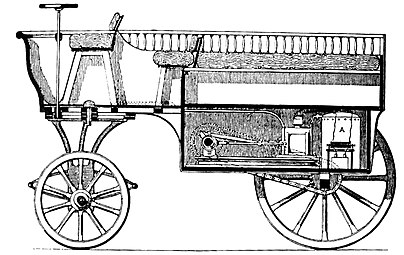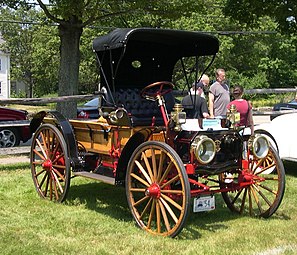Wagon

A wagon or waggon is a heavy four-wheeled vehicle pulled by draught animals or on occasion by humans, used for transporting goods, commodities, agricultural materials, supplies and sometimes people.
Wagons are immediately distinguished from carts (which have two wheels) and from lighter four-wheeled vehicles primarily for carrying people, such as carriages. Animals such as horses, mules, or oxen usually pull wagons. One animal or several, often in pairs or teams may pull wagons. However, there are examples of human-propelled wagons, such as mining corfs.
A wagon was formerly called a wain and one who builds or repairs wagons is a wainwright. More specifically, a wain is a type of horse- or oxen-drawn, load-carrying vehicle, used for agricultural purposes rather than transporting people. A wagon or cart, usually four-wheeled;[1] for example, a haywain, normally has four wheels, but the term has now acquired slightly poetical connotations, so is not always used with technical correctness. However, a two-wheeled "haywain" would be a hay cart, as opposed to a carriage. Wain is also an archaic term for a chariot. Wain can also be a verb, to carry or deliver, and has other meanings.
Contemporary or modern animal drawn wagons may be of metal instead of wood and have regular wheels with rubber tires instead of traditional wagon wheels.
A person who drives wagons is called a "wagoner",[2][3] a "teamster", a "bullocky" (Australia), a "muleteer", or simply a "driver".
Terminology and design[]
The exact name and terminology used is often dependent on the design or shape of the wagon. If low and sideless it may be called a dray, trolley or float. When traveling over long distances and periods, wagons may be covered with fat to protect their contents from the elements; these are "covered wagons". If it has a permanent top enclosing it, it may be called a "van".
Front axle assembly[]
A front axle assembly, in its simplest form, is an assembly of a short beam with a pivot plate, two wagon wheels and spindles[4] as well as a drawbar attached to this. A pin attaches the device to a chariot, a wagon or a coach, making the turning radius smaller.[5]
Types of wagons[]
Wagons have served numerous purposes, with numerous corresponding designs.[5] As with motorized vehicles, some are designed to serve as many functions as possible, while others are highly specialized. This section will discuss a broad overview of the general classes of wagons; for details on specific types of wagons, see the individual links.
Beach wagon[]
Beach wagons are collapsible folding wagons for general multi-purpose usage on outdoor sand beaches.[6]
Farm wagon[]
Farm wagons are built for general multi-purpose usage in an agricultural or rural setting. These include gathering hay, crops and wood, and delivering them to the farmstead or market.[5]
A common form found throughout Europe is the , a large wagon the sides of which often consisted of ladders strapped in place to hold in hay or grain, though these could be removed to serve other needs.[5] A common type of farm wagon particular to North America is the buckboard.
Freight wagon[]
Freight wagons are wagons used for the overland hauling of freight and bulk commodities.[7]
In the United States and Canada, the Conestoga wagon was a predominant form of wagon used for hauling freight in the late 18th and 19th centuries, often used for hauling goods on the Great Wagon Road in the Appalachian Valley and across the Appalachian Mountains.
Even larger freight wagons existed. For instance, the "twenty-mule team" wagons, used for hauling borax from Death Valley, could haul 36 short tons (32 long tons; 33 t) per pair.[8] The wagons’ bodies were 16 feet (4.88 m) long and 6 feet (1.83 m) deep; the rear wheels were 7 feet (2.13 m) in diameter.[8]
Delivery wagon[]
A delivery wagon is a wagon used to deliver merchandise such as milk, bread, or produce to houses or markets, as well as to commercial customers, often in urban settings. The concept of express wagons and of paneled delivery vans developed in the 19th century.[9] By the end of the 19th century, delivery wagons were often finely painted, lettered and varnished, so as to serve as advertisement for the particular business through the quality of the wagon.[10][11] Special forms of delivery wagon include an ice wagon and a milk wagon.
Nomadic wagons[]
Some wagons are intended to serve as mobile homes or mobile workshops. These include the Vardo, a traditional wagon of the 19th-century British Romani people.
Living van[]
Steam wagon[]
The steam wagon, a self-powered development of the horse-drawn wagon, was a surprisingly late innovation, entering service only in the late nineteenth century.
Irrigation tank wagon[]
In the city center of Schwäbisch Gmünd, Germany, since 1992 the city's plants are irrigated using a horse-drawn wagon with a water tank.[12]
Horse drawn wooden tank wagon[]
This section needs expansion. You can help by . (April 2021) |
A horse drawn wooden tank wagon is a wooden cylinder on four wagon wheels. It can carry water, liquid manure or other liquids, but not in turn in the same [13]
War wagon[]
Gravity wagon[]
Chuckwagon[]
Ox wagon[]
Pageant wagon[]
Gallery[]
- Types of wagons

Hay wagons in the UK
A Conestoga wagon, a type of freight wagon used extensively in the United States and Canada in the 18th and 19th centuries for long-distance hauling

A bakery delivery wagon in Queensland, Australia
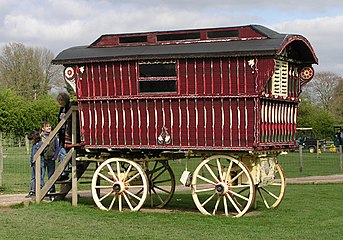
A Romani Vardo from England

The "Lion Tableau" circus parade wagon, built in 1904

Horse wagon, with metal water tank, for irrigation, 2018. The illustration shows regular wheels with tires, instead of traditional wagon wheels
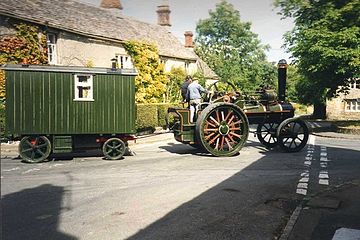
Traction engine with living van
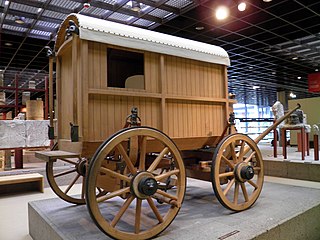
Reconstruction of a Roman traveling wagon richly decorated with bronze fittings, Romisch-Germanisches Museum, Cologne

Horse-drawn fire pump given to Brockhampton Estate in 1818
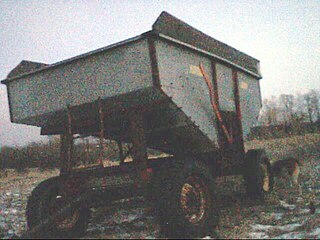
Gravity wagon

A historical recreation of a chuckwagon at the Texas Parks and Wildlife Exposition in Austin, Texas
Chuckwagon still used to prepare food at gatherings in Pecos County, Texas
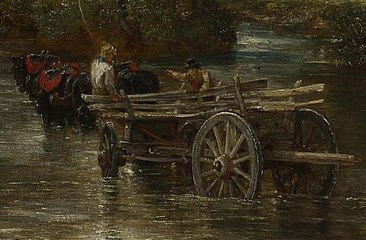
A detail of The Hay Wain by John Constable
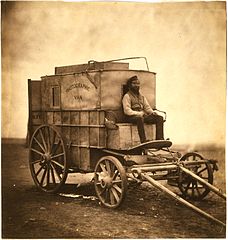
Roger Fenton's photographic van, Crimea, 1855

Bullock (ox) wagon carrying wool in New Zealand, c1880.

Modern reconstruction of a Hussite war wagon
Wagon train[]

In migration and military settings, wagons were often found in large groups called wagon trains.
In warfare, large groups of supply wagons were used to support traveling armies with food and munitions, forming "baggage trains". During the American Civil War, these wagon trains would often be accompanied by the wagons of private merchants, known as sutlers, who sold goods to soldiers, as well as the wagons of photographers and news reporters.[14] Special purpose-built support wagons existed for blacksmithing, telegraphy and even observation ballooning.[15]
In migration settings, such as the emigrant trails of the American West and the Great Trek of South Africa, wagons would travel together for support, navigation and protection. A group of wagons may be used to create an improvised fort called a laager, made by circling them to form an enclosure. In these settings, a chuckwagon is a small wagon used for providing food and cooking, essentially a portable kitchen.
Wagons in art[]

As a common, important element in history and life, wagons have been the subjects of artwork. Some examples are the paintings The Hay Wain and The Haywain Triptych, and on the Oregon Trail Memorial half dollar.
Motorized wagons[]
During a transition to mechanized vehicles from animal powered, the term wagon was sometimes used such as with the Duryea Motor Wagon. In modern times the term station wagon survives as a type of automobile. It describes a car with a passenger compartment that extends to the back of the vehicle, that has no trunk, that has one or more rear seats that can be folded making space for carrying cargo, as well as featuring an opening tailgate or liftgate.[16]
- Motorized wagons

George B. Selden driving an automobile in 1905
Ancient hearse hippomobile (France)
1911 International Harvester Auto Wagon (High wheeler)
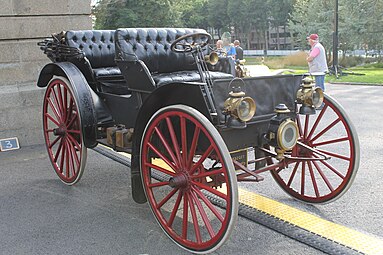
International Harvester Auto-Buggy

International Harvester Auto Wagon

Patent drawing for the Duryea Road Vehicle, 1895
See also[]
- Ackermann steering geometry
- Animal powered vehicles
- Araba (carriage)
- Bronocice pot
- Cart
- Carriage
- Cart wheel
- Chariot
- Chuckwagon
- Chuckwagon racing
- Circle the wagons
- Coach (carriage)
- Horsebus
- Horse-drawn vehicle
- Horse harness
- Lorry (horse-drawn)
- Millwright, an industrial mechanic
- Omnibus
- Pageant wagon
- Scenery wagon
- Stage wagon
- Telega
- Toy wagon
- Trolley
- Types of carriages
- Vardo (Romani wagon)
- Wagon brake
- Wagonette
- Wagon wheel
- Wagon-wheel effect
References[]
- ^ "wain n 1". Oxford English Dictionary (2nd ed.). Oxford University Press. 1989.
- ^ "Wagoner". Merriam-Webster. Retrieved 29 January 2017.
- ^ "Wagoner". The Free Dictionary. Retrieved 29 January 2017.
- ^ spindles
- ^ a b c d "WAGGON". Rees's Cyclopædia. 37. London: Longman, Hurst, Rees, Orme & Brown. 1817–1818.
- ^ https://www.walmart.com/c/kp/beach-wagons
- ^ Gardner, Mark L. (September 1997). "Wagons on the Santa Fe Trail: 1822-1880" (PDF). National Park Service. Retrieved 5 February 2013.
- ^ a b "Twenty Mule Teams". Death Valley National Park. National Park Service. Retrieved 6 February 2013.
- ^ Stratton, Ezra M. (1878). The World on Wheels. New York: the author. pp. 442–444.
- ^ Hillick, M.C. (1898). Practical Carriage and Wagon Painting. Chicago: Press of the Western Painter. pp. 2, 109–116.
- ^ Sanders, Walter R. (1922). Ice Delivery. Chicago: Nickerson & Collins Co. pp. 170–172.
- ^ Ein PS für 160 Blumenkübel, Gmünder Tagespost, Article dated July 31, 2015
- ^ [wagon.https://ohiomemory.org/digital/collection/p15005coll18/id/916/ Wooden tank wagon]
- ^ O'Sullivan, Timothy (1863). "Bealton, VA". Library of Congress Prints & Photographs. Retrieved 5 February 2013.
- ^ "Thaddeus Lowe with his Inflation Wagons". Smithsonian Institution: National Air and Space Museum. Retrieved 5 February 2013.
- ^ "Definition: station wagon". Merriam-Webster.com. Retrieved 9 December 2019.
External links[]
 The dictionary definition of wagon at Wiktionary
The dictionary definition of wagon at Wiktionary Media related to Wagons at Wikimedia Commons
Media related to Wagons at Wikimedia Commons- Chisholm, Hugh, ed. (1911). . Encyclopædia Britannica (11th ed.). Cambridge University Press.
- Wagons

















